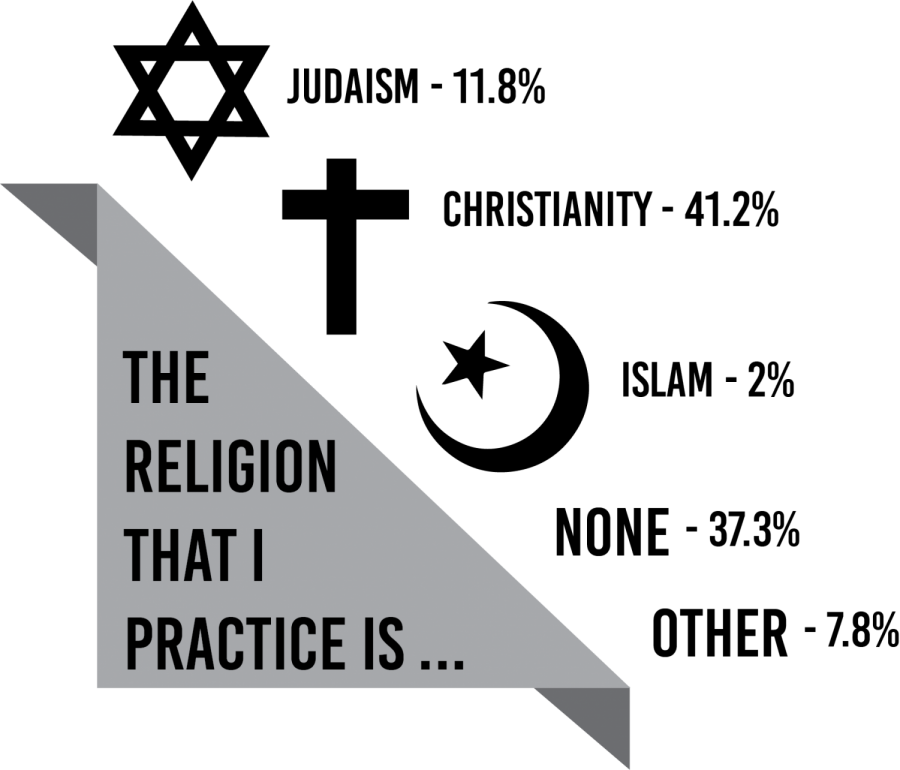In the spirit of education: CHS teaches about religion
Blot graphic by Kara Petrosino
Based on a survey of 51 students from Mar. 23 to Apr. 6, 2020.
May 8, 2020
Students sit patiently in rows facing the white board where World History teacher Tom Ross lectures them on the Quran, the sacred text of Islamic religious beliefs. The lesson is about religion, which can come across as a touchy subject, but no one questions it because it is history.
“I think religion in the classroom gets a lot of bad press,” said Ross, “however as long as we teach objectively simply laying out belief structures without making judgements I think it does a lot of good things.”
Though the First Amendment of the U.S. Constitution established Freedom of Religion, debates on whether or not religion should be discussed in the classroom have not settled.
In the past, public schools strictly prohibited the discussion of religion in the classroom. At one point, it became so extreme that religious discussions in school would make the news headlines the next day. However, the Anti-Defamation League (ADL) claims that today, howbeit it may be uncomfortable or awkward, religion should be discussed. The New Jersey School Boards Association also states that discussions of religion can be present in the classroom if “there is a legitimate, secular, non-religious purpose for an activity…the primary effect of the activity neither advances nor hinders religious belief or practice … the activity does not foster excessive entanglement between the governmental entity and religious concerns.”
According to the ADL, there are several issues that may arise from discussing religion in the classroom, such as obtaining inaccurate information about the religion, alienating those who do not practice a religion and pressuring individuals to speak of their religion.
Sophomore Maggie Schneider of Wall agrees with the ADL when it comes to the issues that may arise from speaking about religion in class.
“I just think that discussing religion in the classroom may make some people uncomfortable,” Schneider said. “Especially if it comes to an argument over personal belief with the classmate and or with the teacher.”
When it comes to religion being discussed in CHS classes, students claim that they have never experienced an awkward moment. Both teachers and students cite professionalism and comfort as reasons why it’s easier to discuss religion at CHS .
“I’ve never had a teacher here make me uncomfortable when they talked about religion because it is either in a historic or a literal context,” said Schneider, “and I feel like in general the students here are comfortable with the teachers, knowing that they wouldn’t do anything to make us uncomfortable.”
Biology and health teacher Jeanine Gomez explained that in her health classes, religion is not normally discussed. However, if it is brought up, Gomez only talks about it if the students and their parents are comfortable with it.
“There have been occasions where students may not have met with me or their parents met with me to discuss the family life unit in Health,” Gomez said. “It is the reason why I always send home a permission form prior to beginning the unit.”
Some students, as well as some teachers, believe that it is completely reasonable to talk about religion in classes where the subject plays an important role. Junior Riley Forrester of Spring Lake Heights speaks on why she believes it is important for religion to be discussed.
“It’s important for different religions to be discussed, like we did in world history freshman year,” said Forrester, “to understand cultures different than we might be used to.”
English teacher Kathryn Diver elaborated on when it is appropriate for religion to be discussed in class.
“I do believe it is necessary to discuss some religious references within texts for clarity purposes,” Diver said, “I also try to make it clear that regardless of what we are reading, when we discuss mythological or religious references, we are speaking about the writer’s individual experience based on concepts or belief systems that impacted them or their society at the time period.”
Freshman Henry Frieman of Holmdel also agrees on when religion should be discussed.
“I mean it depends, if it is just out of nowhere it’s kind of [awkward],” said Frieman, “but again, if it’s a class topic, one hundred percent.”
Ultimately, Ross believes religion plays an important role in the classroom because of how it relates to a lot of class subjects such as literature and history.
“We have a diverse society and I think students need to understand the other principal religions and other worldviews and teaching about the beliefs and the traditions of other people tends to help us avoid prejudice,” Ross said.




